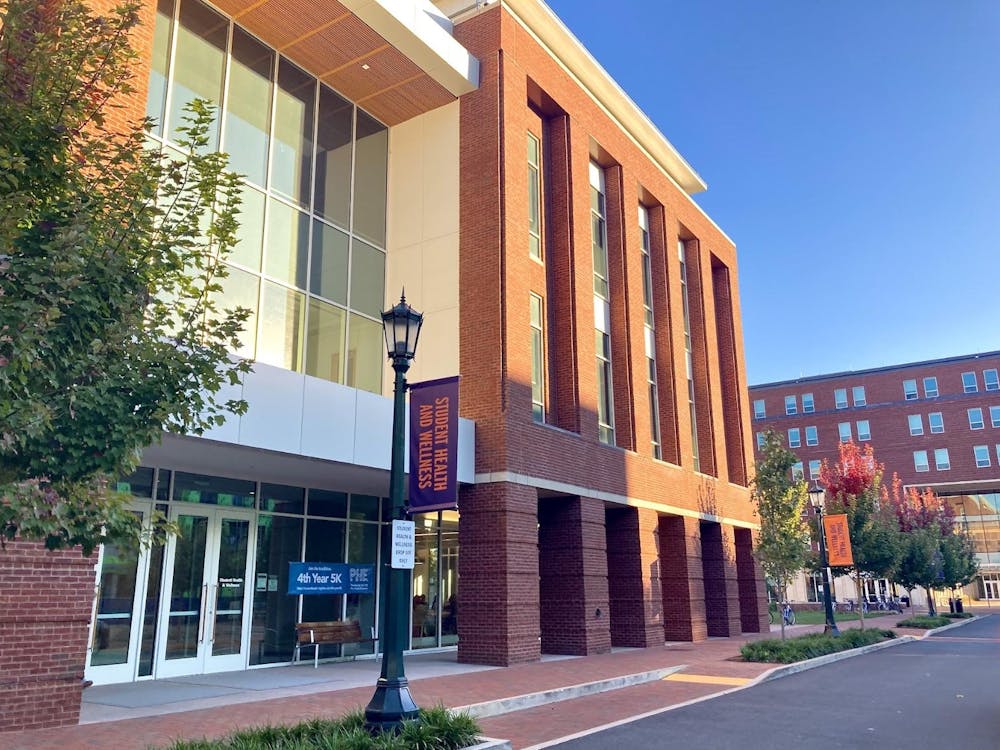The old, white house on Wertland Street could be mistaken for another student-packed dwelling. But the small black sign with white letters that declares "Division of Personality Studies" reminds pedestrians that the building in is fact connected to the University in a different way.
The building houses the life's work of Dr. Ian Stevenson, a University psychiatry professor who is retiring this year, and who, much to some scientists' chagrin, has made a career out of studying evidence for reincarnation. Unlike the pseudo-scientist some might expect, however, Stevenson is responsible for a body of work that has sought a sober, academic treatment of this unusual topic.
While all reincarnation cases have differences, the cases that Stevenson has studied consist primarily of children, aged two to five years, who claim to remember names and events from a previous life. He said children may speak of past possessions, places of residence, and especially the method of the previous personality's death. The children retain these alleged memories until the age of about seven or eight at the latest, although some cases exist where memories were retained longer.
"I think the memories [of previous personalities] get covered by social experiences around the age of five or six," Stevenson said. "The child has a wealth of new experiences and people with whom he must engage."
In about 35 percent of cases there is also a birthmark or birth defect that is associated in some way with the death of the previous personality. For example, a person claiming that his previous personality was killed by a gunshot may have a birthmark that resembles the wound of the previous personality. Sixty to 75 percent of the cases have violent death as a feature, Stevenson said.
According to Stevenson, cases come in various ways.
"In India you can get one in almost every village ... Once or twice we've advertised, or there is a report about us that leads to cases. That's particularly true in the [United] States," he said.
Once a case has been identified, Stevenson will go to the site and conduct an investigation. This usually consists of interviewing the family of the child making the claims, any relevant non-relatives and the family of the supposed previous personality, if possible. Stevenson has developed checklists and forms to fill out to ensure all the basic relevant information is taken down. However, he said the interviews are not heavily structured.
"Usually we begin with the parents, with some open question like 'How did this begin?' We try to let them speak spontaneously," he said. "We fill in gaps with our checklist."
Depending on how much there is to a case, Stevenson and colleagues will make subsequent meetings with informants.
Born in Montreal in 1918, Stevenson was exposed to the idea of reincarnation early in life. When he first began his work, he had no problems with studying it.
"I was sympathetic to it in principle. My mother had an extensive library on eastern religions," he said. "I had no idea about the extent of the evidence, though."
That evidence has consisted of over 2,000 cases Stevenson has studied around the world since he began in 1960. He and his colleagues have visited Thailand, Burma, India, Sri Lanka, Lebanon, Turkey, Nigeria, Alaska and British Columbia, and he has made "forays" into Senegal, Nepal, Syria and Brazil. He has written nine books on his research since 1966.
Stevenson began his work after writing an essay analyzing some reports of reincarnation claims. That essay drew the attention of a foundation in New York that financed Stevenson's first trip to India. Subsequently, Stevenson's work attracted the attention of xerography (the process of making photocopies) inventor Chester F. Carlson. Carlson left a substantial bequest to the University that allowed the formation of the Division of Personality Studies.
For 10 years, 1957 to 1967, Stevenson was a professor and chairman of the University's Department of Psychiatry, and he was Chief Psychiatrist at the University Hospital. Since 1967, however, Stevenson has been Chester F. Carlson Professor of Psychiatry and Director of the Division of Personality Studies.
Stevenson said he believes the world might be a more complicated place than most scientists would have the public believe. In his book, "Children Who Remember Previous Lives," Stevenson put forth the idea, based on his research, that there may be a component of the mind that can exist independently of the physical body.
"I think that scientists haven't thought enough about the mind-brain problem, and I don't think they have thought enough about the limitations of genetics," he said. He added that he was "discontent with current theories of human personality."
"I think that genetics, psychoanalysis and behavior don't account for everything in human personality," Stevenson said.
"Our ideas are sort of subversive. The general belief is that the mind is equal to the brain. The neuroscientists have virtually all the funding and control the journals. We've had trouble publishing our data, but we've also had successes here and there," he said.
Stevenson and a colleague recently had an article studying single-egg twins who claimed to remember previous lives published in the well-known medical journal The Lancet.
Research at the Division of Personality Studies does not confine itself solely to reincarnation, however. Stevenson and his colleagues have studied paranormal phenomena ranging from extrasensory perception (ESP) to out-of-body experiences. But the division's primary areas of study are the reincarnation cases and cases of near-death experiences.
In spite of the immense volume of work published by Stevenson and his colleagues, there has been very little notice taken of it.
The work "has mostly been ignored," Stevenson said.
One of the groups critical of Stevenson's work is the Committee for the Scientific Investigation of Claims of the Paranormal (CSICOP), certain members of which have criticized the possibility of reincarnation on theoretical grounds.
"They don't really give the evidence a fair hearing," Stevenson said. Nevertheless, there has been legitimate criticism of Stevenson's work.
Stevenson said criticism has "been -- I think properly -- [focused] on memories that are fallible."
He said other critics argue that cases often originate from Eastern cultures in which the idea of reincarnation is more acceptable. However, contrary to what one might expect, many such cases are suppressed by the child's parents.
This situation is especially true in India, a major source of cases. According to Stevenson, 40 percent of parents in India suppress their children's past life memories.
"Not that they are skeptical, but they don't like the content of the child's statements," he said. "Some children reject their parents or are snobs because they claim to be from a different caste."
Other critics propose that some other paranormal activity, such as ESP or possession, might be at work in these cases. Stevenson discounted ESP because the children exhibit no evidence of knowing details except those associated with the previous personality. ESP also does not explain the cases with birth defects. However, he admitted that possession is more difficult to eliminate.
Possession "doesn't explain the birth defects, and it also doesn't explain the amnesia," he added. "If you propose a possessing spirit, why does it quit after four or five years?"
Although leery of media attention, Stevenson is always willing to discuss his work with students.
"I haven't been approached often to speak, but I never decline to speak with students," he said. In December, Stevenson spoke at a meeting of the Roundtable Group, a Contracted Independent Organization that has weekly discussions on various topics.
"I had read a profile published in The Washington Post last year. I had wanted to look him up since the beginning of the year and it just worked out," said Sandra Beasley, a second-year College student and Roundtable Group President. Stevenson's lecture dealt with the "difficulties and intrigue" in studying claims of reincarnation scientifically, Beasley said.
The event was crowded with about 70 people; the turnout far exceeded the usual attendance of 20 to 25, she said.
"People were outside the door peering in," she added. "There was a huge amount of interest from all corners of the University community."
"Dr. Stevenson's work is absolutely admirable," Beasley said. "He single-handedly redeemed a field that was mired for years in pseudo-science.
"He's put so much work into moving away from a religious explanation that eventually a new theory will have to come about," she said.
Beasley did note the presence of a number of skeptics in attendance.
"Dr. Stevenson's brief speech was reasonably entertaining and certainly thought-provoking," third-year College student John Keeton said. However, Keeton said, the lecture left him unconvinced.
"Like any other set of religious doctrines it is unprovable and improbable," he said.
Stevenson is used to his work getting attention.
Tom Shroder, an author and editor at the The Washington Post, wrote a book about Stevenson called "Old Souls: The Scientific Evidence for Past Lives." After some initial resistance, Stevenson agreed to have Shroder interview him and accompany him on field trips to Lebanon and India. Shroder said Stevenson's sober approach to the subject of claims of reincarnation attracted him.
"And not just the sober treatment, but the very concrete nature of the alleged evidence. Real kids and real witnesses to very specific behaviors and statements," he said.
Some critics have questioned Stevenson's investigative techniques, but Shroder discounts these criticisms.
"I'm certain he would welcome any other researcher to investigate these cases with a superior technique, and cheer them on," Shroder said. "This hasn't been just his work, but his life."
Even after such a long career documenting so many cases, Stevenson denies emphatically that his work "proves" the existence of reincarnation.
"I'm quite earnest in saying that we don't have proof of reincarnation, only that we have evidence that points in that direction," he said. Even if one accepts the explanation that these cases are actual reincarnations, Stevenson called the idea that everyone who dies is reincarnated "purely conjectural."
Stevenson cited a mix of reasons for his impending retirement, including wanting to spend more time writing. He is now working on a book detailing North American reincarnation cases. And he said he is confident that some "good younger people" will contribute to his field.
"We will continue pretty much as we are," Division Research Asst. Dawn Hunt said. Both Dr. Jim Tucker and Dr. Bruce Greyson, psychiatrists in the Division, will continue the work, Hunt said.
But without Stevenson, the inconspicuous building that houses a life's work will have lost one memorable personality.




